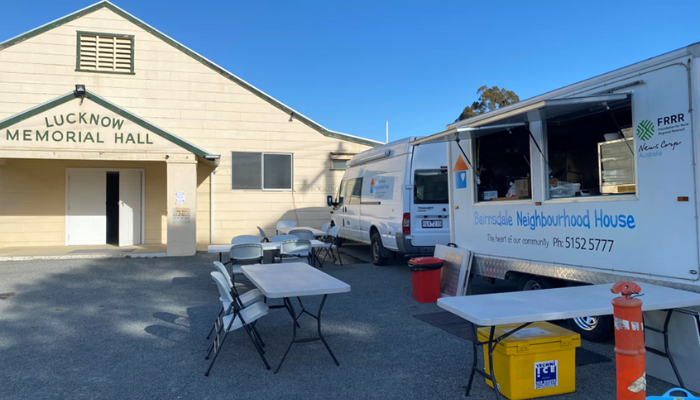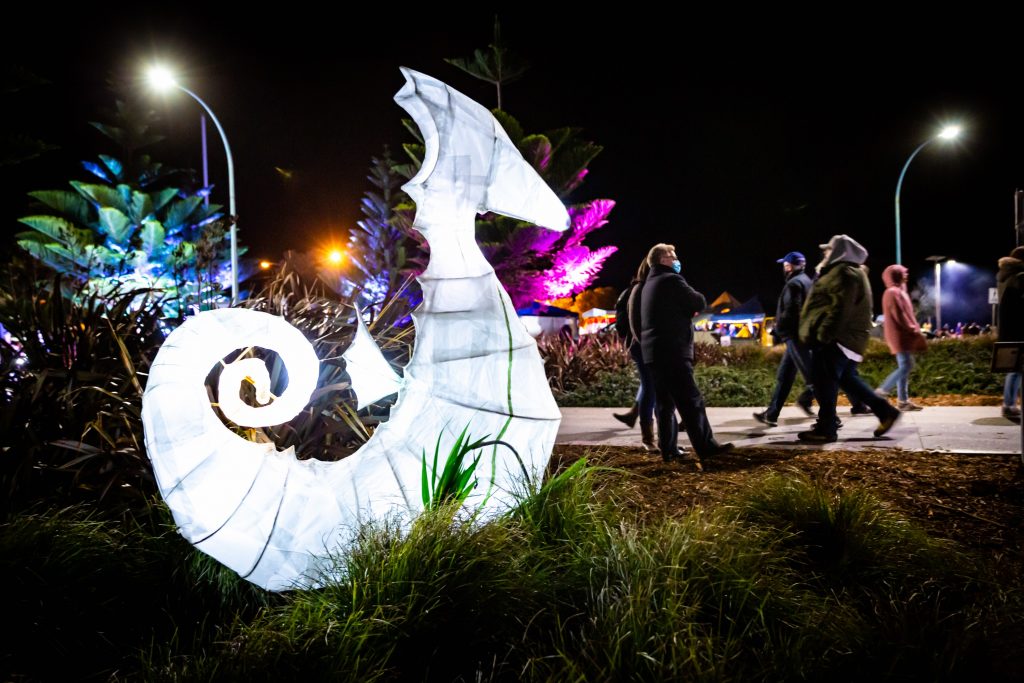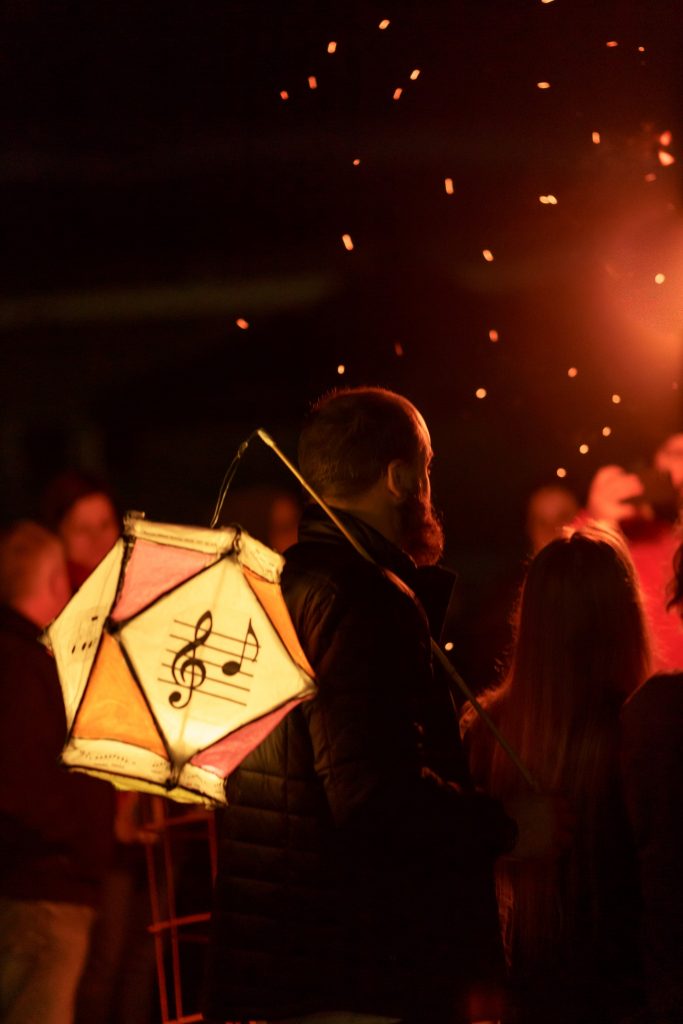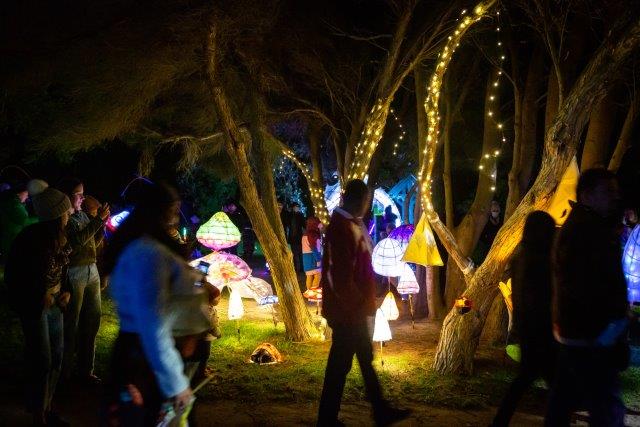Foundation for Rural & Regional Renewal (FRRR)
The 2019-20 bushfires caused immense devastation, with more than 54% of East Gippsland burnt, resulting in the loss of homes, livelihoods and infrastructure. Thousands of people were displaced, many farms and businesses lost equipment and livestock, resulting in some people losing both their homes and their jobs overnight. The community was left reeling. In the immediate aftermath, Bairnsdale Neighbourhood House (BNH) sprang into action, providing essential meals and support at Emergency Relief Centres and Community Recovery events. However, BNH was ill-equipped to meet the growing demand, relying on an inefficient setup involving a staff member’s vehicle and a mobile cool-room.

With support via FRRR through the News Corp Bushfire Fund, BNH embarked on a project to enhance their disaster response capabilities. Their original plan was to fit out a donated Ford transit van, but supplier delays caused by COVID made this impossible. Instead, they purchased a new custom built food trailer which was already in stock with another supplier. It came fitted with stainless steel benches, fridges, freezer, exhaust fans and lighting. BNH sourced hotplates and a deep fryer which were then fitted and connected by a local registered Plumber / Gas fitter. The fabulous sign writing was completed by local business.
The innovative approach considered more than just disaster recovery, with the design considering how to mobilise the trailer as a catering kitchen during other community activities. The trailer can be stationed on-site, providing sustenance to volunteers and contributing to community recovery.
“We now have a valuable resource for the community of East Gippsland that will be available in times of not only community crisis but our road to recovery over the next 10 years.”
The food trailer facilitates the distribution of essential fresh foods, meals, and catering to remote and disaster-affected areas, ensuring families and individuals receive vital support. Moreover, with the new food trailer, the donated van can continue its role in the Food Rescue program, collecting bulk food donations from local supermarkets, restaurants, and food manufacturers. These donations are then transformed into nutritious meals for individuals in crisis or provided as food hampers.
The flexibility of the food trailer and its capacity to serve the community during recovery events and planting initiatives highlight its multifaceted role in supporting the resilience of East Gippsland. Despite challenges brought about by COVID and lockdowns, the project successfully adapted to changing circumstances, ultimately enhancing BNH’s ability to respond effectively to future disasters.
The devastating impacts of the 2019/20 Black Summer bushfires were particularly harsh in the East Gippsland region of Victoria.
To help revive spirits and bring people back to the region, a group of locals came up with the idea of The East Gippsland Winter Festival, an event to be held over the Winter Solstice. It would bring people back to the region during the traditionally quieter period to celebrate and showcase the art, food, culture and nature, as well as help the community heal and recover.
Then COVID hit, making the challenges all the greater. However, the volunteer committee was determined to proceed – just 12 months later than originally planned.
FRRR supported this new Festival with a $25,000 grant. The grant funded a Community Engagement Manager to help connect artists, schools, community groups and individuals with local venues, galleries, businesses and organisations and to provide support to event organisers.
And what an event it was, with 85 local events plus 24 lantern-making workshops held in the lead up to the Festival. In total, it attracted nearly 20,000 people and more than 75 local businesses were involved, ensuring the impact was widespread.
Adam Bloem, Festival Founder and Committee Chair, said they were absolutely blown away by the response!
“It was much bigger and better than we ever expected for a first-year event. While COVID was still a big and stressful challenge, we were very lucky that the festival fell within a four week window of no lockdowns and Melbourne open to travel to regional Victoria!
“The community support and engagement was fantastic. Virtually every town across East Gippsland got involved and organised their own events or installations to be part of the program.
“I think the best thing was the free lantern making workshops. They were very popular and people loved them! They loved coming together and getting creative, making something with their hands and many people commented on the great sense of community that was felt at the workshops.
“The thing I am most proud of is the many comments that I have received from people saying the Winter Festival has helped the region to come together and heal after the devastating Black Summer bushfires,” Mr Bloem said.
Check out some of the amazing photos from the Festival.
The Bushfire Recovery Fund grant program, funded by HMSTrust and the Sidney Myer Fund, has recently awarded a grant of $110,000 to be paid over two years to the bush nursing centre at Swifts Creek in East Gippsland. Bush nursing centres operate in locations remote from the medical facilities of major hubs and where there is no local doctor or pharmacy. Swifts Creek Bush Nursing Centre played a central role in supporting the local community and emergency services workers during the Black Saturday fires and continues to provide backbone support to the communities recovery.
The project titled “Sustainable Remote Community Health Services”, will support the organisation working towards key organisational goals for future service delivery. The Bush Nursing Manager is a multi-faceted role, encompassing a complex range of nursing duties combined with business management. There is significant risk to the centre with changes to key staff such as the Bush Nursing Manager and/or key members of the Committee of Management.
The grant will build the capacity of the organisation to tackle the systemic complexity of the health sector and be strategic in navigating the local health system to ensure that it meets the compelling needs of the recovering community now and well into the future.





